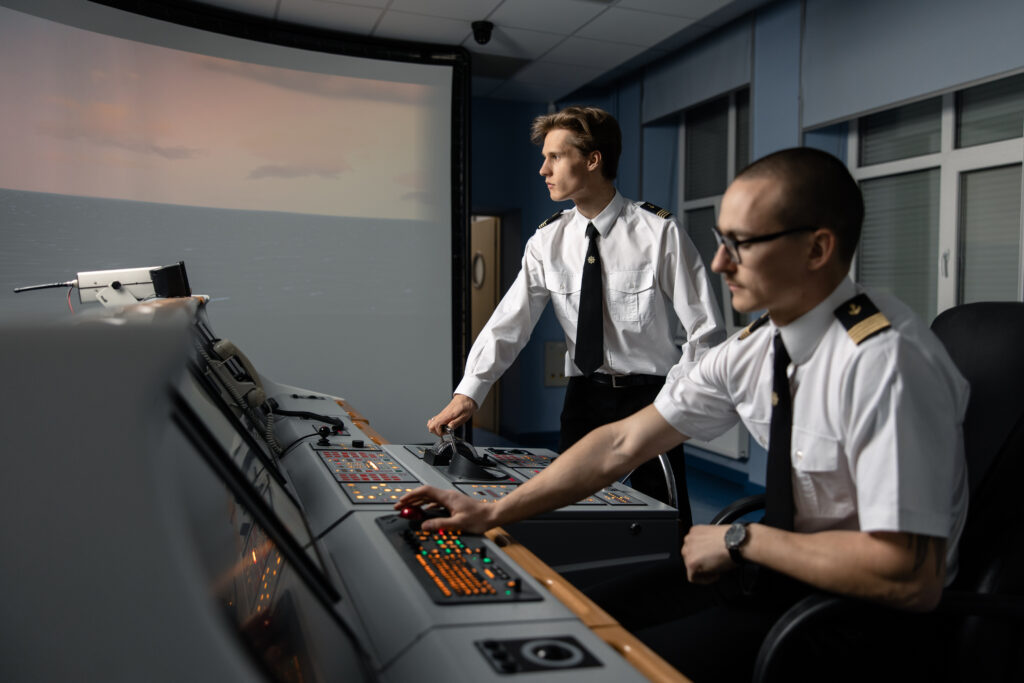
The training programmes were prepared according to the International Convention on Standards for the Training, Certification and Watchkeeping of Seafarers (STCW), International Maritime Organization (IMO) model training programmes, and the requirements of directives of the European Union (EU).
SAFETY, SURVIVAL, AND SECURITY TRAINING PROGRAMMES
– Personal Survival Techniques, Fire Safety and Fire Fighting, Basic First Aid, Personal Safety and Social Responsibility
– Work with lifeboats, rafts and rescue boats (other than high-speed lifeboats)
– Work with high-speed lifeboats
– Special fire fighting
– First aid
– Medical care
– Ship’s security officer
– Seafarers assigned security-related duties
– Safety training for all seafarers
TRAINING PROGRAMMES FOR SHIPMASTERS
– Radar Navigation, Radar Marking, and Use of Automatic Radar Plotting Aid (ARPA)
– Radar Navigation, Radar Marking, and Use of Automatic Radar Plotting Aid (ARPA), bridge control, search and rescue
– Use of Electronic Chart Display and Information System (ECDIS)
– Bridge resource management
TRAINING PROGRAMMES FOR SHIP MECHANIC AND ELECTROMECHANICS
– Management of engine room resources
– Basics of safe operation of high-voltage electrical equipment on ships
– Basic training for the safe operation of high-voltage power systems on ships
– Special training for the safe operation of high-voltage power systems on ships
– Management of ship’s turbine installations
GMDSS TRAINING PROGRAMMES
– Global Maritime Distress and Security System (GMDSS) general purpose radio operator
– Global Maritime Distress and Security System (GMDSS) limited purpose radio operator
– Global Maritime Distress and Security System (GMDSS) general purpose radio operator (for those qualified as a GJARSS limited purpose radio operator)
TRAINING PROGRAMMES FOR SPECIAL TYPES OF SHIPS
– Security skills, crowd management, crisis management and human behavior of staff directly serving passengers in their designated areas on all passenger ships
– Assurance of passenger safety, cargo safety and hull tightness in all passenger ships
– International carriage of hazardous cargoes
– Initial preparation for loading of oil and chemical tankers
– Special training for loading of oil tankers
– Special training for loading of chemical tankers
– Initial preparation for loading of liquefied gas tankers
– Special preparation for loading of liquefied gas tankers
– Initial training for work on ships covered by the IGF Code
– Work on ships sailing in polar waters
– Initial training for work on ships with azipod propellers
– Advanced training for work on ships with azipod propellers
TRAINING PROGRAMMES FOR MARITIME DEGREE GRANTING AND QUALIFICATION CERTIFICATION
– Training of seafarers
– Training of ship’s motorist
– Training and qualification improvement courses for shipmasters
– Training and qualification improvement courses for ship mechanics
– Specialists in charge of the deck service of the crew of fishing vessels of 24 meters in length and longer, operated in waters of unrestricted navigation
– Qualification improvement of electromechanics


